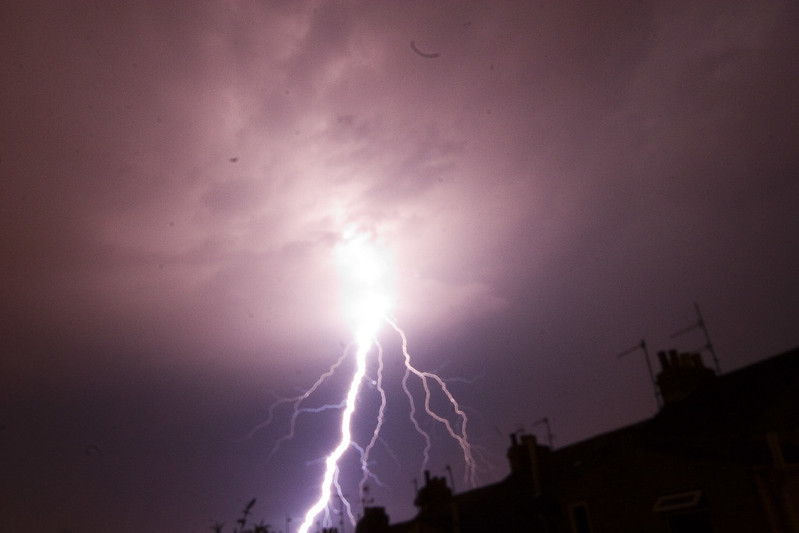
07 Sep Damage from Lighting Strikes
Damage from Lighting Strikes
A direct lightning strike will cause significant damage to roof, electrical and nonelectrical items in the home. Often, this will start a fire in the wiring within the walls or the attic. It can also cause structural damage to the roof, chimney, or sometimes the windows or foundation.
If it happens to be the foundation, we’re looking at a real serious problem. A problem that is not a DIY project for amateurs. Remember always consult a professional first. Protecting your home must be done right in order to avoid any costly damages or even legal issues with your homeowner’s insurance if things are not up to code. Staying protected on all fronts is a must.
Lightning is one of nature’s most spectacular shows. Unfortunately, it is also one of the most dangerous. Each year, lightning kills more people than tornadoes and hurricanes combined. In the United States, an average of 51 people are killed by lightning each year, and hundreds more are seriously injured.
While deaths from lightning strikes are not common, they are often tragic. This is because a single lightning bolt can carry up to 100 million volts of electricity. When that much voltage hits a human body, it can instantly stop the heart and lungs, causing death.
True story; my grandfather, also known as “Pops,” was struck by lightning, not once but twice! What are the odds of that happening? He attributes it to wearing his sneakers with rubber soles. On the other hand, my grandmother, also known as “nana,” said Pops survived those lightning strikes because he was too mean to die! Either way, my Pops was an anomaly and went on to live to be 85 years old.
It might be surprising to learn that your home is not very safe from lightning either. In fact, your home is probably the most dangerous place to be during a thunderstorm. That’s because lightning tends to strike the highest point in an area. And, since your home is usually the tallest object around, it is more likely to be struck by lightning than anything else.
Lightning can cause a lot of damage to your home. A direct strike will often start a fire; even a near strike can damage your electrical system. That’s why it’s so important to have your home’s electrical system inspected by a qualified electrician every few years.
Can lightning crack a foundation?
Shock waves. Lightning can create breaks and cracks in brick, concrete, stone, and even cinderblock. For example, chimneys made from brick and stone can take a significant amount of damage. Likewise, a shock wave can damage walls, shatter windows, and even create cracks in your home’s foundation.
While a direct strike is the most dangerous, a near strike can also cause significant damage. For example, the electrical current from a lightning bolt produces a magnetic field that can induce an electric current in nearby metal objects, like pipes or wires. This induced current can damage electrical appliances and start fires.
Lightning protection systems can help reduce the risk of damage to your home from lightning strikes. These systems provide a path for the electrical current to flow around your home rather than through it.
Building codes do not require lightning protection systems in most areas, but they are a good idea if you live in an area where thunderstorms are common. If you live in an area that is prone to lightning strikes, there are some things you can do to protect your home. One of the best things you can do is install a lightning protection system. Of course, you could do it yourself, but it is probably not the wisest choice; better to call a professional contractor.
What happens when lightning hits concrete?
Do concrete structures ever suffer severe damage when they are struck by lightning? Yes, frequently, they do. When lightning strikes a concrete structure, it can cause the concrete to break into pieces. In addition, the force of the strike can also cause the steel reinforcement bars, or rebar, to break.
When this happens, it is called “spalling.” Spalling can cause serious damage to a concrete structure and can be very expensive to repair. That’s why it’s so important to have your home’s electrical system inspected by a qualified electrician every few years.
Should a spalling incident happen on your property with serious foundation cracks, you’ll definitely want to contact a professional immediately for an estimate and repairs. Continuing to use the structure without proper repairs can result in further cracking and instability.
According to the National Weather Service, there are about 20 million lightning flashes in the United States annually. That works out to about 55,000 flashes per day.
Most of these flashes are called “cloud to ground” flashes, meaning that the lightning bolt originates in a cloud and then strikes the ground. These types of flashes account for about 70% of all lightning flashes in the U.S.
The other 30% are “intra-cloud” flashes, meaning the lightning bolt stays entirely within the cloud. These types of flashes are not as dangerous, but they can still cause damage to your home if they strike nearby.
Can lightning strikes damage electronics?
If you have a Smart Home, there are additional ways for lightning to enter your home. For example, wireless devices such as garage door openers, security cameras, and thermostats can be potential entry points for a lightning strike. Even the home’s electrical meter can be a path for lightning to enter the house.
Not only can a lightning strike melt metal and start fires, but it can also destroy electronic equipment. Furthermore, the surge of electricity often causes power outages that last for extended periods.
If you have a Smart Home, there are steps you can take to protect your investment:
- Ensure that a professional home automation company installs your system
- Make sure that your system is protected by an Uninterruptible Power Supply (UPS) or a generator
- Install surge protectors on all of your devices and appliances
- Have your home’s electrical system inspected by a qualified electrician
While surge protectors offer some protection, they are not foolproof. A direct lightning strike can cause damage even to equipment that is appropriately surge-protected. The best way to protect your electronics is to unplug them during a thunderstorm.
Lightning is one of nature’s most impressive displays. But it can also be one of the most destructive forces. However, by taking some simple precautions, you can help protect your home and possessions from the damage a lightning strike can cause.
Damage from lightning strikes
In conclusion, a foundation crack because of a lightning strike on your home might be one of the worst-case scenarios, but if you have a solid homeowners or renters insurance policy, you should be covered for the repairs at least. If you’re ever in doubt, call your insurance agent to be certain. Remember, take simple precautions to help protect your home and possessions from damage during a thunderstorm, contact a professional contractor, and stay safe.


No Comments